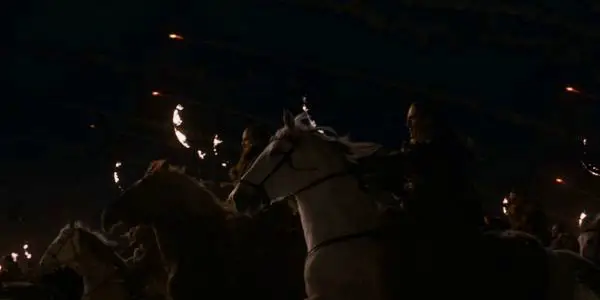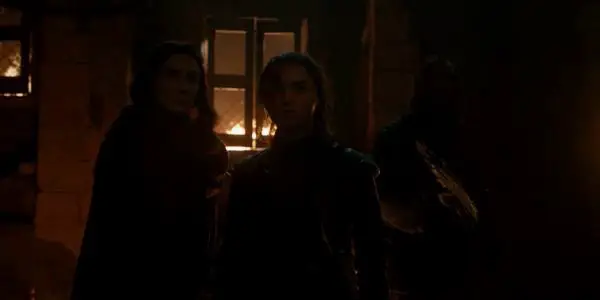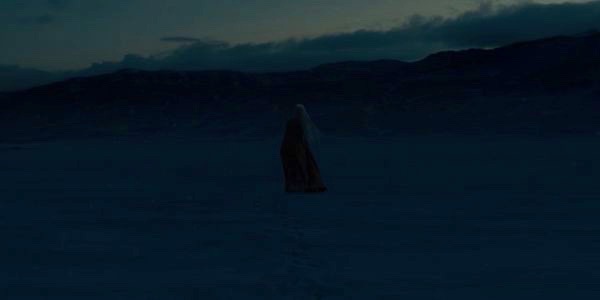GAME OF THRONES (S8E3) “The Long Night”: All Prophecies Must Die

Soham Gadre is a writer/filmmaker in the Washington D.C. area.…
Last night’s episode “The Long Night”, was an ode to the tradition of appointment-viewing television that Matthew Zoller Seitz discussed a few weeks back. It was as anticipated an episode of television as has ever been broadcast, reaching heights of discussion and prediction on the levels of legendary event episodes in TV lore, such as the series finale of Lost and the “Who Done It” episode of Dallas.
What we witnessed was something we had been waiting for nearly two years, maybe more, and what we got was a cathartic television ending. One that belied the bittersweet spectacle that made George R.R. Martin and Game of Thrones the unconventional brutal spectacle we had grown to love in its loathsomeness.
The Many Faces of Game of Thrones
This is a conflict that I have been battling with when it comes to my fandom of Game of Thrones. I started watching this series in college and was enraptured like many others not only by the scale of its production, something unprecedented in television history (the only thing even close may have been HBO’s short-lived Rome), but also by the fact that it paid almost no heed to the sensitivities of an American TV-viewership base that has grown accustomed to its heroes being heroes and its villains getting their comeuppance.

Revenge in Game of Thrones came slowly, if at all. The evil and vile were tearing the good to pieces faster than the good could rectify their losses and gain an advantage. It was the whole basis of the show’s popularity. When Ned Stark was executed, when the Red Wedding happened, when Theon was tortured mercilessly by Ramsey Bolton, and when Rickon got his heart shot out by an arrow right as he was about to be carried to safety by Jon Snow, the show forced us to do something TV almost never does… come to terms over and over again with our helplessness while watching it. It is what gained Game of Thrones its respect.
The morbid curiosity of wondering which beloved figure of our national reverence was going to get slaughtered and have their blood drained out into the muck before us as we try not to break down in despair, was a breakthrough in how we engaged with a storyline. It was what made the anticipation of The Battle of Winterfell that much greater. There were bets wagered, nails bitten off, heavy breaths. We braced for that feeling Game of Thrones gave us so many times.
The battle itself was a spectacle of cinematic scope and dynamic cinematography and editing mixed with very poor lighting that diminished the former’s brilliance. It rose and fell in tides of hopelessness and courage. Melisandre, a character who has deserved our scorn for much of the series, was arguably the single most significant catalyst for the defeat of the Army of the Dead. She, with the power of the Lord of Light, a character who functions as a theological conversation piece throughout the film, conjures fire to help defeat many of the wights, and in her greatest moment, helps Arya recall her destiny, which leads to the episode’s most talked about event.

Arya Stark
Arya Stark’s journey had reached a tipping point. Episode three was a reminder for us and Arya that her past had come full circle. When Sansa isn’t sure what to do with the dagger she holds in her hand, Arya coyly repeats a line to Sansa that Jon told her when she was young: “stick them with the pointy end”. Her realization of what Melisandre prophecized for her (“Brown eyes, blue eyes, green eyes. Eyes you’ll shut forever.”) offered both a validation that everything Arya learned and trained for was for the culminating sequence where she kills the Night King, and that maybe Melisandre was right about the Lord of Light after all.

These are nice endpoints to long-standing threads that stretch way back many seasons in the show. Yet, at the end of this episode, there was a feeling of too many niceties that didn’t sit right. For an episode so many people waited for and sweated over, it felt like we were conveniently chauffeured to the ending they thought we wanted: A veritable TV ending. We didn’t really have to work emotionally for anything that occurred. The two supposed most powerful and important characters in the show, Jon and Daenerys, did close to nothing of significance. The deaths of Lyanna Mormont and Jorah Mormont as auxiliary characters were easy enough to swallow. Theon’s death was a true end to a painful but worthy story-arc for him. Arya leaped in out of nowhere and ended hours of blood and fire in one second. As if the writers wrote us a thank you letter for following the show for so many years. Of course our favorite character, Arya Stark, saved everyone. A gesture that was both gratifying and narratively disingenuous.
A Fork in the Road
The episode would have been a much more memorable piece of storytelling had it been the final episode of the entire series. The last shot of Melissandre walking into the cold, barren distance, turning from red to grey and finally falling as the piano played her out, was a brilliant artistic choice by Miguel Sapochnik to definitively end the prophecies of many characters. It made the show’s formulaic writing feel like it had more weight in the moment. The cut to black would have been not only a good tie up for the show’s ultimate goal but a good cliffhanger of an ambiguous future for everyone left in shambles following the battle.
Instead, there are three episodes still left, and Cersei and the Iron Throne (which made no appearances in the last two) still waiting. Frankly, the storyline there is almost an epilogue following “The Long Night”. The show spent so much time drumming up the battle with the Dead and the prospect of the end of the world, that everything that comes after will be second fiddle in intensity and importance. The fork in the road that Game of Thrones is left with now is whether they will play out the season as we expect it, dig into the low stakes, and end with good feelings as a payoff for all our viewership loyalty, or give us something to actually talk about and remember for decades to come.
Game of Thrones will be back on HBO on Sunday, May 5th.
Does content like this matter to you?
Become a Member and support film journalism. Unlock access to all of Film Inquiry`s great articles. Join a community of like-minded readers who are passionate about cinema - get access to our private members Network, give back to independent filmmakers, and more.
Soham Gadre is a writer/filmmaker in the Washington D.C. area. He has written for Hyperallergic, MUBI Notebook, Popula, Vague Visages, and Bustle among others. He also works full-time for an environmental non-profit and is a screener for the Environmental Film Festival. Outside of film, he is a Chicago Bulls fan and frequenter of gastropubs.













